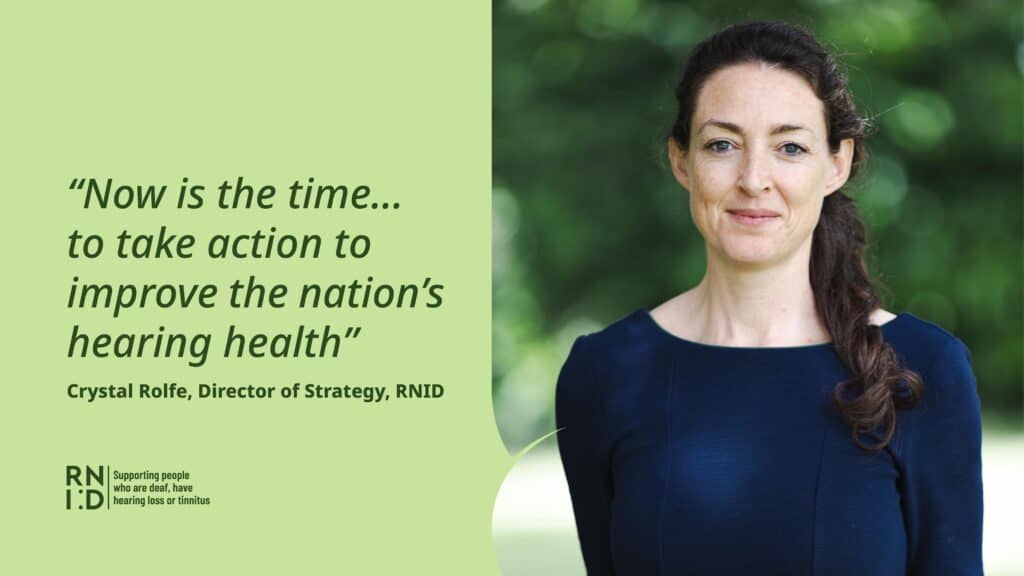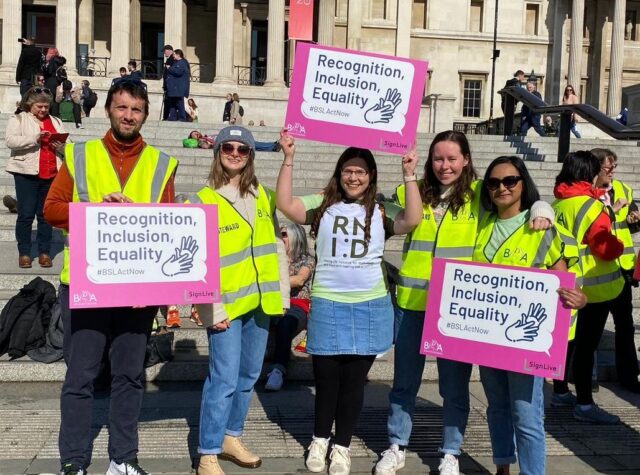
The Prime Minister has set out the three major changes the Government wants to bring to the NHS in England. Our Director of Strategy, Crystal Rolfe, explains how we believe these reforms should be applied to NHS audiology services.
Anyone who has waited months, or even years, for an NHS hearing aid will know that our audiology services are in crisis. The NHS has not recovered since the Covid pandemic, and people with hearing loss are not getting the treatment they need. The Government commissioned Darzi Report highlights that these problems exist across the NHS in England.
We welcome the response delivered by Prime Minister Keir Starmer in his speech to The King’s Fund. In it, he outlined the three big shifts he wants to see in NHS policy — changes we support and wish to see applied to audiology services.
What did the Prime Minister say?
After the General Election, the Government commissioned Lord Darzi to conduct an immediate and independent investigation of the NHS. Lord Darzi published his report, Independent Investigation of the National Health Service in England, on 12 September 2024. It concluded that the NHS is in serious trouble and is currently recording historically low levels of public satisfaction.
The Prime Minister used the release of this report to outline the three big shifts the Government will implement to begin NHS reform:
- Shifting more care from hospitals to communities
- Moving from an analogue to a digital NHS
- Moving from treating sickness to focusing on prevention.
What could, and should, this mean for NHS audiology services in England?
Firstly, let’s look at what we currently know about NHS audiology services. Since Covid, the government has stopped collecting data on waiting times from referral to treatment in audiology, but we have heard from patients who have waited two years to receive their hearing aids. Nearly 30,000 patients are on a waiting list, having already waited over 13 weeks just for a diagnostic test in audiology.
Our research into NHS audiology patients has shown that when trying to access support for their hearing loss, they face confusing referral processes, limited appointment availability, and a lack of information about the range of hearing aids or assistive technology available.
There is an urgent need to reform and improve NHS audiology services. We believe audiology services are well positioned to take on the Government’s proposed reforms.
So, what are the three big shifts the Government has outlined?
Too many patients face long waits for audiology appointments, with their only option being hospital based audiology services. We advocate for a wider range of community audiology services across England. This approach can reduce the costs of delivering these services, increase patient choice, and reduce waiting times.
We also believe that different forms of community services can be provided to address the specific needs of different community areas. Various models could be explored, including hospital audiology staff offering care through different community services, including secondary care, high street clinics, social enterprises, or even Community Diagnostic Centres. This diversity could foster innovation and help spread best practices across the NHS.
Our ‘Blocked Ears Blocked Access: The crisis of NHS wax removal services’ report from January found evidence that some areas of the NHS are sending people to very expensive hospital care to have excess ear wax removed, or not providing any option for professional removal at all. This is an area where community care should be used to ensure all patients can access effective services.
At present, the NHS does little to encourage people to check their hearing at any stage in adulthood, despite growing evidence that early uptake of NHS hearing aids could reduce the risk of developing conditions such as dementia and depression, while also improving the treatment of hearing loss itself. A digital hearing check, like the one developed by RNID, should be added to the existing NHS Health Check.
New evidence from the Lancet Commission on dementia shows that hearing loss is the largest modifiable risk factor for dementia, with hearing aids reducing this risk. The commission strongly recommended that the Government “make hearing aids accessible for people with hearing loss.”
Despite this, the NHS does not currently promote regular hearing checks or encourage people to seek healthcare support when hearing loss is identified. Of the 7 million adults who could benefit from hearing aids, only around 2 million use them. Addressing this under-treatment of hearing loss would help prevent further healthcare issues for patients. A digital hearing check, like RNID’s, should be included in the NHS Health Check for adults over 40.
The shift from analogue to digital hearing aids, a transformation RNID led in the early 2000s, revolutionised NHS audiology and improved hearing healthcare for millions. We are now at the point where not only hearing aids, but the entire hearing healthcare system must transition from analogue to digital.
Digitally enabled healthcare should help people choose which parts of the audiology pathway they want to access, and to do so remotely. This may increase the number of people who take action for their hearing health, make the audiology pathway more efficient, and support more people being seen. High quality, Bluetooth enabled hearing aids connected to apps should be standard, empowering people to manage their hearing loss while allowing audiology services to meet growing demand.
The move from analogue to digital also presents opportunities to improve how the NHS records and shares people’s communication needs, and to improve meeting those needs — both in audiology services and across the broader NHS. Currently, people who are deaf or have hearing loss are often underserved by an NHS that may only allow them to book appointments by telephone or fail to recognise their need for a BSL interpreter, putting their health at risk.
The Darzi review’s plans for an enhanced NHS App should include features that help meet the Accessible Information Standard. For example, the app should allow users to log their communication needs and update them as necessary. This information must be readily accessible to healthcare professionals. Furthermore, the app should offer alternatives to booking appointments by telephone.
National and Political Leadership
There have been too many missed opportunities to reform NHS audiology services, such as the Action Plan on Hearing Loss, published in 2017. Now is the time for ministers and NHS England to show leadership and take action to improve the nation’s hearing health.
We will continue to present our evidence and amplify the voice of patients to the Department of Health and Social Care and NHS England to drive these essential changes to NHS audiology services.
